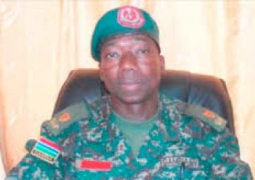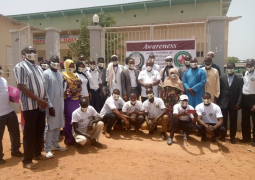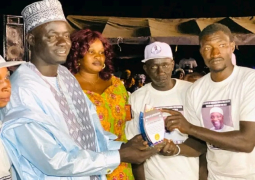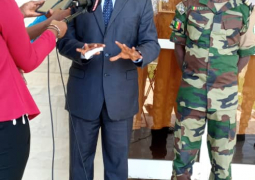Speaking during the payment exercise, Alieu Begaye Mbaye, a beneficiary and resident of Joben in CRR south, expressed high satisfaction and appreciation to the World Bank and The Gambia government.
"I didn't have my breakfast because I was at the farm. Then my wife called and informed me about the payment at Bati Njol village. With happiness, I left everything I was doing and ran to the pay point," he said.
Jobe added that the first thing he would do with the money is to buy a bag of rice and oil, saying he would also save some and buy a goat for rearing. He believes that in the future, anything they get from the goat will be the project’s impact.
Sohna Cham, a resident of Madina Chamen and a beneficiary, also explained that they were told about others who need to receive the cash and if they're not able to utilize the cash as expected, the purpose of the project would be defeated.
"We don't want that to happen. We don't want to mess the project and therefore the money will be put to good use that will please the donors. I will hand over the money to the household head who is my husband and I will engage him in dialogue on how we should use the money."
Abdou Aziz Ceesay, the director for Social and Behavioral Change Communication at the National Nutrition Agency (NaNA), highlighted the significance of the project, saying it is one of the best projects in The Gambia, looking at the economic situations around the world. He said the project came in the midst of several global problems including the Covid-19, Ukraine war, the increased price in fuel, and the increase in basic food commodities.
"Having a project to build the resilience of the extreme poor is timely. The first rollout is significant because we are getting into the lean period, a time where farmers face challenges because they grow their crops and are yet for consumption. The money will help them boost their health and their nutritious status."
During the design of the project, he continued, that they targeted the rural areas based on the ISS survey and the government survey that identify poor households. Looking at the expectations at a time from the World Bank and The Gambia government, Mr. Ceesay said, they realised they could only target the rural households of over 15, 606.
On Urban poverty, he said, there are extremely poor households within the urban area and it's even harder if one is poor and lives within the urban settlement. He hinted that if they perform well; and negotiate with the government and the World Bank, there could be a possibility of extending it to the Greater Banjul Area.
"With women being the principal recipients, we have agreed with the World Bank that 70-75% should be women. We have reasons for doing that because we learned from other countries. Sometimes when you allow men to receive the cash, they might not listen to the social and behavioural change communication and the women might not know the cash value their men received. In other countries, we learned men spent the money on things that were not designed for."
For beneficiaries, Ceesay asked them to diversify their diets that are rich in macronutrients and as well save some. He reiterated that the project will come to an end and therefore they want to see beneficiaries elevating their status to another level.
"They can get into backyard gardens, rear goats, do petty trading, make soaps, and do other macro finance activities that can generate extra income."
Ebrima Dibba, a programme officer for Monitoring and Evaluation at NaNA, told journalists at Bati Njol that the beneficiaries didn’t only receive cash but health and nutritional education.
"The cash transfer is also accompanied by social and behavioural change communication which is an important component of the project. Giving them cash is not enough because without telling them the importance of adopting desirable behaviours, the money will not benefit them."
Bakary Fofana, at the Department of Community Development in CRR south, said the project is essential for food security because it’s designed to elevate them from poverty at the household level.
"Most of the primary beneficiaries are vulnerable. I believe with this project, issues of food insecurity and dependency will be addressed. The process is fair and transparent and the selection was done by an international firm.





